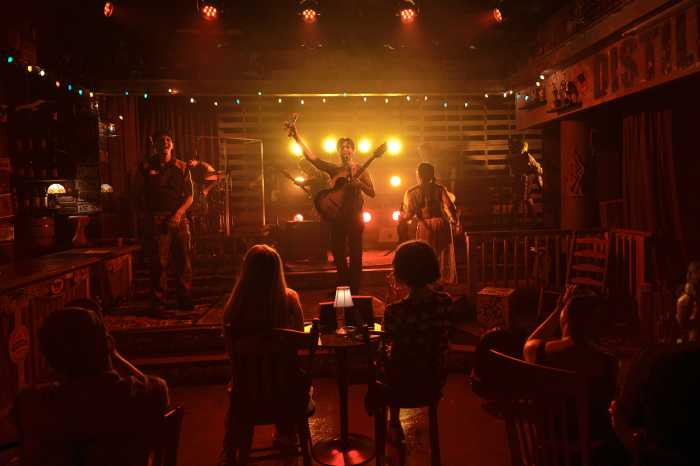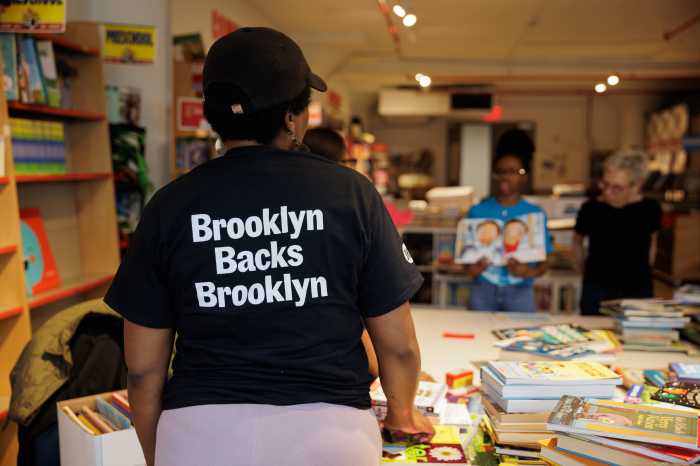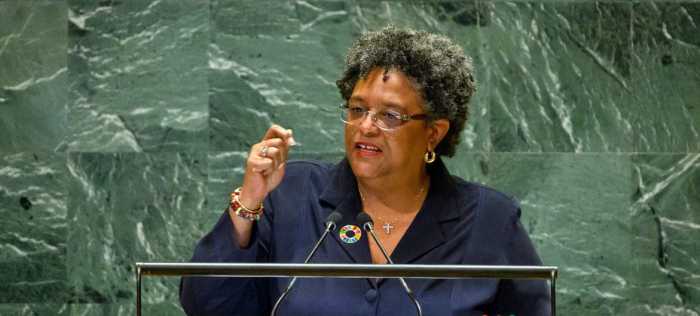If, as George says in “Sunday in the Park with George,” “Art isn't easy;” then allegory has got to be a bear. At least it proves so in two plays now at the Public, “Conversations in Tusculum” and “Drunk Enough to Say I Love You?” Both are thinly veiled critiques of the Bush administration and the mess in Iraq and, while intriguing in different ways, both fall prey to the problems of political theater in general.
Neither play really stages a fair fight because the playwright controls the argument. Political theater in our age has become like nothing so much as Fox News – often strident and “fair and balanced” only as a marketing ploy.
Of these two plays, Caryl Churchill's “Drunk Enough to Say I Love You?” surmounts its stridency better. It is never dull. With a running time of 44 minutes, it would be hard pressed to be. It imagines the unsteady relationship between the US and Great Britain around the Iraq invasion as a tempestuous, dysfunctional gay romance.
Two plays at the Public talk (and talk and talk) about politics.
Under the persistent and subtly disquieting influence of Sam, an American, Guy, a Brit, is seduced into the affair, which he enters wholeheartedly and against his better judgment. Guy becomes completely besotted, but Sam proves manipulative and untrustworthy.
This is an angry little play, and Churchill writes it in truncated sentences, for which we, the audience, are supposed to supply the closure from our presumed agreement with what she is saying. Whether or not one agrees with her politics, the technique sets up an interesting dynamic and actively engages the audience intellectually.
In fact, in its abstraction “Drunk Enough” could become kind of a Rorschach test of one's political leanings. The conceit works because of the play's brevity, but even in such a short time, it begins to wear a little thin.
DRUNK ENOUGH TO SAY I LOVE YOU?
The Public Theater
425 Lafayette St., btwn.
Astor Pl. & E. Fourth St.
Tue. at 7 p.m.; Wed.-Sat. at 8 p.m.;
Sat. at 2 p.m.; Sun. at 3 p.m.
Through Apr. 6
$50, $25 for students; 212-967-7555
CONVERSATIONS IN TUSCULUM
The Public Theater
425 Lafayette St., btwn.
Astor Pl. & E. Fourth St.
Thu.-Sat. at 8 p.m.;
Sat. at 2 p.m.; Sun. at 3 p.m.
Through Mar. 30
$50, $25 for students; 212-967-7555
The play is performed in a black space surrounded by a lit proscenium, which adds an air of carnival voyeurism to the proceeding. The two characters appear on a couch, which is suspended and moves up and back away from the audience as the play and the arguments become more desperate. Props enter and are dropped into the void, and the visual life of the play is stunning, particularly Peter Mumford's lighting that uses color and shadow judiciously and pointedly to complement the argument.
James Macdonald's direction is equally pointed, and the fine performances by Scott Cohen as Sam and Samuel West as Guy are sterling examples of actors in complete control of their craft, committed to a concept and making it work.
Still, after this, and other political plays over the past weeks, I have to admit that I'm just a little talked out.
“Conversations” was probably a key reason for my fatigue. Playwright and director Richard Nelson sets up Caesar as a tyrant and a villain from the get-go and admits no voice to present his perspective. Even if Caesar will ultimately fall, the foregone conclusion and lack of any intellectual tension – especially in a play almost completely devoid of action – undermines the dramatic impact of the piece.
Playwrights, of course, have always used the stage to make their political points. Shaw certainly did. Though Shaw always tipped his hand as to his philosophical biases, he at least had enough courage in his convictions to offer a rousing fight between differing views. That's why plays like “Heartbreak House” and “Major Barbara” maintain their interest and relevance. “Conversations,” on the other hand, is merely talky and turgid.
Set in 45 B.C., the play concerns Brutus who is on the outs politically. Having supported Pompey against Caesar, he has retreated to Tusculum, a kind of exile/think tank where he finds like-minded folks like Cicero and Cassius, who mostly mope around and whine about when and how they are going to return to power. Brutus, a traitor to the victor, has been pardoned by Caesar, and struggles, both politically and existentially, to reconcile his beliefs with Caesar's decision to let him survive.
Nelson, who directs his own work at a leaden pace that extends more than two-and-a-half hours, offers few insights we haven't seen in other contexts. Brutus talks about how his pardon is a stronger leash than any other Caesar could put on him, while Cicero and Cassius have concluded that rendering unto Caesar that which will secure their survival is a small price to pay, even if they later upbraid themselves their spinelessness.
Their ability to reconcile their fate may in fact be the play's most interesting allegory for our contemporary culture, but it's a long time coming and makes the long talky passages seem both unnecessary and cynical. Cicero and Cassius often come across less like political animals than simply posturing gasbags and, heaven knows, nobody needs go to the theater these days to witness that.
The actors speak their lines well; in fact, that's about all they're asked to do. Aidan Quinn as Brutus trades on his impressive personal charm to be the stand-out in the production. Neither Brian Dennehey as Cicero or David Strathairn as Cassius gets much of an opportunity to showcase their significant talent, nor, for that matter, does the marvelous Maria Tucci, who plays Brutus' mother. Nelson has been blessed with all this talent and then doesn't let it shine.
The play ends with an exhortation to kill Caesar. We know that's what will ultimately happen, but in this context it comes off as not so much a rallying cry to action but rather as the last, desperate option of the marginalized and ineffectual. And that, my friends and countrymen, is just plain dull.


































